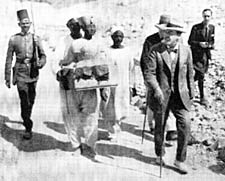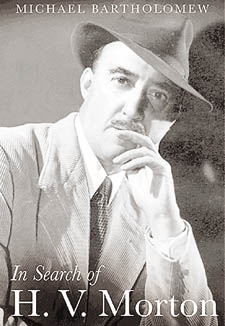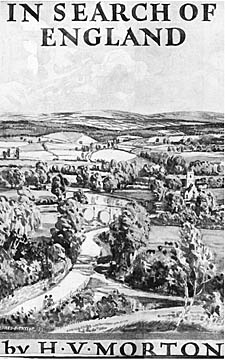
Morton’s big break as a reporter came with the opening
of Tutankhamen’s tomb in 1923. Here Morton, far right,
takes surreptitious photographs as treasures are removed

 |
The Nazi sympathies of England's voice
He was one of the most popular
travel writers of the 20th century, but an unsavoury racist
and womaniser lay beneath the surface, writes Dan Carrier
In Search of HV Morton
by Michael Bartholomew
Methuen, £8.99
order this book
HV Morton was covered in sweat. He had a raging temperature
and a neck that was so stiff he had to turn his entire body
to the left and right to take in the view.
Perched on a rock at the top of Mount Sinai, the travel writer
gazed out towards Egypt and was overcome with homesickness.
He was convinced he had meningitis and was hours from death.
He made a vow: “If I survive, I shall turn my pen towards
England. No more writing about foreign climes – I want
England’s climate to soothe my brow.”
This moment of homesickness was to forge one of Britain’s
most popular travel writers.
A Daily Express reporter, Morton was in the Middle East to cover
the discovery of Tutankhamen’s tomb. He returned home –
he had nothing more than a seven-day fever – and stuck
to his promise.
He wrote a daily column and sparked a career writing travel
books and these provide a backdrop for this biography by Michael
Bartholomew.
For Morton’s fans, the biography will make distressing
reading.
Bartholomew says that as a youngster Morton was “susceptible
to the myth that the real England is not the England I actually
lived in – a sprawl of semis, municipal parks and parades
of dull shops”.
Morton’s ‘Olde England’ viewpoint took his readership
like his biographer back to a comfortable, pre-World War I era.
He had a turn of phrase similar to PG Wodehouse and he applied
it as he guided his readers around London, England, Scotland,
Wales and Ireland – “I can never go to Regent’s
Park without thinking how brilliantly Nash ransacked the ancient
world and adapted it to the requirements of the English butler…
there is something exquisitely well-bred about the appearance
of Regent’s Park, almost as if Nash had sent Athens to
Eton,” he wrote.
But this biography unmasks a serial womaniser who could not
stay faithful to either of his two wives and held views which,
even in terms of the era he wrote in, were racist.
Bartholomew draws on Morton’s memoirs, letters and columns
to track a career that started at the Birmingham Post and ended
at a desk in a mansion in South Africa.
In his 1928 best-seller, In Search Of London, Morton talks of
Soho in terms of the ethnic make-up of the people who live there. “The Hugenots settled there and foreigners have been attracted
to the place ever since,” he wrote.
“Today the restaurants and film trade dominate Soho, and
the crowds that fill the streets are alien crowds as different
from a typical London crowd as the exotic grocers shops of Soho,
with their flasks of Chianti, their Parmesan cheese, their tunny
fish and cloves of garlic, differ from the shops of the ordinary
English grocer.”
His writing about a club in Tottenham Court Road is more sinister: “There were 400 African natives dancing with wild abandon
and a high proportion of them with white girls.”
He describes their clothing, commenting on the flashy garb of
some and others who he describes as “wild as if they had
dropped in from the bush, but they all knew how to dance to
the jungle rhythm”.
He also finds room to mention his contemporaries that are now
inexplicably linked with literature written between the wars.
He adds: “The great of Bloomsbury are almost too numerous
to mention… more recent residents have linked the name
of Bloomsbury with intellect and communism. The Bloomsbury intellectual
suggests to the modern Londoner a talkative young pipe-smoker
with a beard and coloured shirt.”
Morton was a mercenary: he wrote to order, and did not care
if his work reflected his personal views.
This is clearest when writing during the war. Bartholomew shows
from Morton’s diaries that he was an admirer of Nazi Germany.
Morton thought the most favourable outcome would be for England
to barter for peace or for Germany to invade.
This he kept private: he was commissioned to write propaganda
pieces on subjects such as a factory turning out Wellington
bombers and agricultural colleges training land girls and he
donated the cash earned back to the war effort. He also took
control of his Home Guard unit, and he took his duties seriously.
He wrote favourably about the Home Guard, saying “should
the rest of England fall, our own parish would hold out to the
last man.” Yet in his journal he described his unit as
a “bunch of ungrateful yokels”.
And then his unquenchable thirst for sex also comes through:
Bartholomew deciphered a series of symbols in Morton’s
diaries that refer to liaisons with other women.
Although he married twice, he was incapable of remaining faithful
to either of his wives. He even two-timed his mistresses, visiting
prostitutes on a regular basis and managing to find the time
when waiting to change trains at La Gare du Nord to visit a
brothel for 20 minutes.
But such revelations make the biography a racy read, but also
create an underlying problem.
For those who enjoy his books, his apparent gentleness will
be shattered after reading this biography.
|




